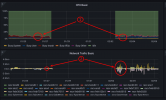Another question: What about network latencies? We found this:
https://www.cubewerk.de/2020/10/23/ceph-performance-guide-2020-for-ssd-nvme/
There one can read:
What can affect the overall performance of a ceph-cluster?
Slow network (latency!), bad/slow disks, lack of CPU-cycles.
[...]
ping -c 100 IP of your ceph node
Ran above ping test from one node to another.
0.05-0.07ms latency is ok.
[...]
When we do that in our cluster (in the 40Gb RSTP Loop Network, directly connected, no switch involved) we have those values:
172.20.81.11 -> 172.20.81.12:
# ping 172.20.81.12
PING 172.20.81.12 (172.20.81.12) 56(84) bytes of data.
64 bytes from 172.20.81.12: icmp_seq=1 ttl=64 time=0.103 ms
64 bytes from 172.20.81.12: icmp_seq=2 ttl=64 time=0.092 ms
64 bytes from 172.20.81.12: icmp_seq=3 ttl=64 time=0.110 ms
64 bytes from 172.20.81.12: icmp_seq=4 ttl=64 time=0.146 ms
64 bytes from 172.20.81.12: icmp_seq=5 ttl=64 time=0.121 ms
64 bytes from 172.20.81.12: icmp_seq=6 ttl=64 time=0.101 ms
64 bytes from 172.20.81.12: icmp_seq=7 ttl=64 time=0.127 ms
64 bytes from 172.20.81.12: icmp_seq=8 ttl=64 time=0.095 ms
64 bytes from 172.20.81.12: icmp_seq=9 ttl=64 time=0.120 ms
[...]
rtt min/avg/max/mdev = 0.092/
0.112/0.146/0.016 ms
172.20.81.11 -> 172.20.81.13:
# ping 172.20.81.13
PING 172.20.81.13 (172.20.81.13) 56(84) bytes of data.
64 bytes from 172.20.81.13: icmp_seq=1 ttl=64 time=0.102 ms
64 bytes from 172.20.81.13: icmp_seq=2 ttl=64 time=0.068 ms
64 bytes from 172.20.81.13: icmp_seq=3 ttl=64 time=0.084 ms
64 bytes from 172.20.81.13: icmp_seq=4 ttl=64 time=0.058 ms
64 bytes from 172.20.81.13: icmp_seq=5 ttl=64 time=0.071 ms
64 bytes from 172.20.81.13: icmp_seq=6 ttl=64 time=0.064 ms
64 bytes from 172.20.81.13: icmp_seq=7 ttl=64 time=0.095 ms
64 bytes from 172.20.81.13: icmp_seq=8 ttl=64 time=0.097 ms
64 bytes from 172.20.81.13: icmp_seq=9 ttl=64 time=0.140 ms
64 bytes from 172.20.81.13: icmp_seq=10 ttl=64 time=0.134 ms
64 bytes from 172.20.81.13: icmp_seq=11 ttl=64 time=0.073 ms
64 bytes from 172.20.81.13: icmp_seq=12 ttl=64 time=0.069 ms
64 bytes from 172.20.81.13: icmp_seq=13 ttl=64 time=0.067 ms
64 bytes from 172.20.81.13: icmp_seq=14 ttl=64 time=0.061 ms
64 bytes from 172.20.81.13: icmp_seq=15 ttl=64 time=0.062 ms
64 bytes from 172.20.81.13: icmp_seq=16 ttl=64 time=0.081 ms
[...]
rtt min/avg/max/mdev = 0.058/
0.082/0.140/0.024 ms
172.20.81.12 -> 172.20.81.13:
# ping 172.20.81.13
PING 172.20.81.13 (172.20.81.13) 56(84) bytes of data.
64 bytes from 172.20.81.13: icmp_seq=1 ttl=64 time=0.077 ms
64 bytes from 172.20.81.13: icmp_seq=2 ttl=64 time=0.077 ms
64 bytes from 172.20.81.13: icmp_seq=3 ttl=64 time=0.058 ms
64 bytes from 172.20.81.13: icmp_seq=4 ttl=64 time=0.084 ms
64 bytes from 172.20.81.13: icmp_seq=5 ttl=64 time=0.061 ms
64 bytes from 172.20.81.13: icmp_seq=6 ttl=64 time=0.062 ms
64 bytes from 172.20.81.13: icmp_seq=7 ttl=64 time=0.061 ms
64 bytes from 172.20.81.13: icmp_seq=8 ttl=64 time=0.076 ms
64 bytes from 172.20.81.13: icmp_seq=9 ttl=64 time=0.076 ms
64 bytes from 172.20.81.13: icmp_seq=10 ttl=64 time=0.083 ms
64 bytes from 172.20.81.13: icmp_seq=11 ttl=64 time=0.067 ms
64 bytes from 172.20.81.13: icmp_seq=12 ttl=64 time=0.063 ms
64 bytes from 172.20.81.13: icmp_seq=13 ttl=64 time=0.063 ms
64 bytes from 172.20.81.13: icmp_seq=14 ttl=64 time=0.065 ms
64 bytes from 172.20.81.13: icmp_seq=15 ttl=64 time=0.068 ms
64 bytes from 172.20.81.13: icmp_seq=16 ttl=64 time=0.067 ms
64 bytes from 172.20.81.13: icmp_seq=17 ttl=64 time=0.064 ms
64 bytes from 172.20.81.13: icmp_seq=18 ttl=64 time=0.066 ms
[...]
rtt min/avg/max/mdev = 0.058/
0.068/0.084/0.007 ms
Conclusion:
Latencies of Node1 <-> Node2, Node1 <-> Node3 seems to be high (and always higher, than the recommended 0.05-0.07), whereas just the latencies between Node2 <-> and Node3 look slightly better and are in range of 0.05 - 0.07
Could that play a role in our case somehow?





